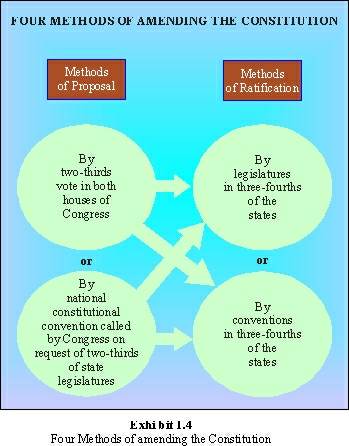1.8 The Bill of Rights
The first ten amendments to the Constitution, adopted in 1791, are commonly referred to, as the ’Bill of Rights.’ It guarantees the following rights:
The right to freedom of speech, press assembly and petition. (Amendment Number I)
The right to bear arms. (Amendment Number II)
The right not to quarter soldiers in peacetime, except according to the law. (Amendment Number III)
The right to have security against "unreasonable
searches and seizures." (Amendment Number IV)
The right not to be held to answer criminal charges except upon indictment by grand jury; not to be compelled to be a witness against oneself; not to be put twice in jeopardy for the same offense; not to be deprived of life, liberty, or property without due to process of law; to have just compensation for private property, taken for public use. (Amendment Number V)
The right to trial by jury in criminal prosecution, to be notified of the charges, be confronted with witnesses, and to have legal counsel and have the compulsory process for calling witnesses. (Amendment Number VI)
The right to a trial by jury in law suits involving over 20 dollars. (Amendment Number VII)
The right that prohibits excessive bail or fines, or cruel and unusual punishments. (Amendment Number VIII)
The right against denying or disparaging others retained by the people. (Amendment Number IX)
 Click here to enlarge
Click here to enlarge
|